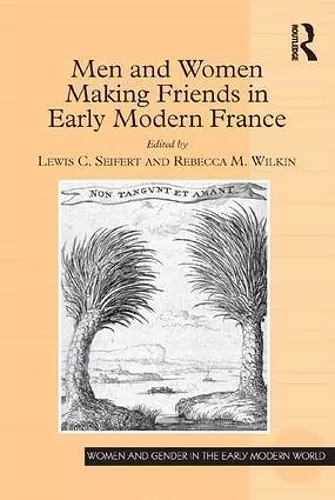Men and Women Making Friends in Early Modern France
Rebecca M Wilkin editor Lewis C Seifert editor
Format:Hardback
Publisher:Taylor & Francis Ltd
Published:14th Jul '15
Currently unavailable, and unfortunately no date known when it will be back
This hardback is available in another edition too:
- Paperback£38.99(9781032922409)

Today the friendships that grab people’s imaginations are those that reach across inequalities of class and race. The friendships that seem to have exerted an analogous level of fascination in early modern France were those that defied the assumption, inherited from Aristotle and patristic sources, that friendships between men and women were impossible. Together, the essays in Men and Women Making Friends in Early Modern France tell the story of the declining intelligibility of classical models of (male) friendship and of the rising prominence of women as potential friends. The revival of Plato’s friendship texts in the sixteenth century challenged Aristotle’s rigid ideal of perfect friendship between men. In the seventeenth century, a new imperative of heterosociality opened a space for the cultivation of cross-gender friendships, while the spiritual friendships of the Catholic Reformation modeled relationships that transcended the gendered dynamics of galanterie. Men and Women Making Friends in Early Modern France argues that the imaginative experimentation in friendships between men and women was a distinctive feature of early modern French culture. The ten essays in this volume address friend-making as a process that is creative of self and responsive to changing social and political circumstances. Contributors reveal how men and women fashioned gendered selves, and also circumvented gender norms through concrete friendship practices. By showing that the benefits and the risks of friendship are magnified when gender roles and relations are unsettled, the essays in this volume highlight the relevance of early modern friend-making to friendship in the contemporary world.
'Men and Women Making Friends in Early Modern France deepens our understanding of early modern friendship, from the early 16th century well into the 18th century, and signifies a valuable recent critical trend to move away from a conceptual approach to friendship- its representation in literature and its theorization in moral philosophy - to tangible concerns: how did friendships actually work, who were friends to each other, can we trace networks of friends? Questions of gender and sex are also introduced: how could women participate in the culture of friendship, how does this culture accommodate the classical discussion of homosexuality? Deftly combining literary and contextual perspectives on a topic just as engaging today as it was in the days of Descartes and Elizabeth of Bohemia, this collection is a sine qua non for any student of early modern culture.' Ullrich Langer, University of Wisconsin, Madison, USA
ISBN: 9781472454096
Dimensions: unknown
Weight: 725g
316 pages